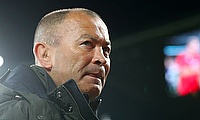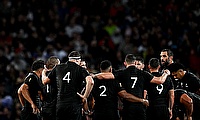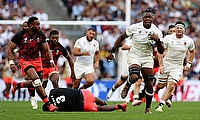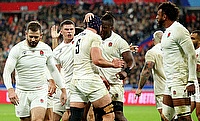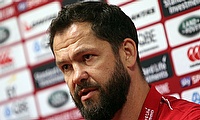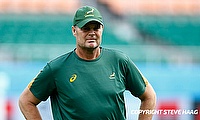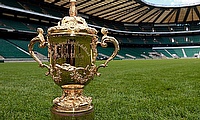All-time Rugby World Cup XV
The Rugby World Cup is now just weeks away and we were inspired to look back at previous editions of the tournament and compiled our all-time RWC XV.
To clarify, this selection was made purely on performances at RWCs, and therefore some obvious standouts over the last 30 years, such as Christian Cullen, Danie Gerber and Dan Carter, don’t make the cut.
Let us know what you think and who would make your all-time RWC XV.
15. Matt Burke, Australia (1995, 1999 and 2003)
A contemporary of Cullen, Burke never received the worldwide acclaim of his Kiwi rival, but his performances at World Cups, particularly Australia’s successful campaign in 1999, were of the highest order. Burke had every tool required to be a top class full-back, from a precise boot and excellent defensive positioning, to fleet-footed and dangerous counter-attacking ability.
Honourable mentions – Serge Blanco (France), Gavin Hastings (Scotland), Percy Montgomery (South Africa)
14. Jason Robinson, England (2003 and 2007)
Having appeared in just two tournaments, Robinson doesn’t have the resume of some of the other members of this squad, but he was as close to uncontainable as any player not named Jonah Lomu in the competition’s history. The pocket battleship sliced, diced and powered his way through all opposition in 2003 and though injury struggles dogged him in 2007, he was a key reason as to why England made it all the way to the final.
Honourable mentions – Ieuan Evans (Wales), John Kirwan (New Zealand), Jeff Wilson (New Zealand)
13. Brian O’Driscoll, Ireland (1999, 2003, 2007 and 2011)
O’Driscoll is an outlier in this XV as not only is he the only man included not to make it to a RWC final, but he is also the only man included not to make it to a semi-final. Given the lack of success he has had at the tournament as part of a team, his presence in the XV is a testament to the extraordinary ability the man displayed, seeing off competition from the more successful duo of Sella and Carling.
Honourable mentions – Philippe Sella (France), Will Carling (England), Scott Hastings (Scotland)
12. Tim Horan, Australia (1991, 1995 and 1999)
A two-time RWC winner, Horan is widely regarded as the finest inside centre to have played the game. The Australian was instinctive and full of skill, but also perfectly measured in his execution, capable of undoing opposition defences in an instant. Guscott came closest to dethroning Horan but lacked the success of his Australian rival, whilst Jauzion was sublime at his best, but didn’t offer the same consistency as Horan or Guscott.
Honourable mentions – Jeremy Guscott (England), Yannick Jauzion (France), Ma’a Nonu (New Zealand)
11. Jonah Lomu, New Zealand (1995 and 1999)
Aside from O’Driscoll, Lomu is the only player in this XV not to have won a RWC. Looking back, it seems almost impossible to believe that those Lomu-inspired All Blacks teams of the 90’s couldn’t cross the finishing line, but none of the blame for that can be hoisted upon Lomu. The mammoth winger bulldozed his way through grown men as if they were children and can surely be credited as the first ‘superstar’ of rugby.
Honourable mentions – David Campese (Australia), Rory Underwood (England), Bryan Habana (South Africa)
10. Jonny Wilkinson, England (1999, 2003, 2007 and 2011)
It’s difficult to think of too many players as vital to their side as Wilkinson was to the England team of the early 2000’s. An unerring boot, uncompromising tackling and underrated attacking ability, Wilkinson was the dream fly-half for the fine-tuned machine that was the 2003 England team. Injuries played their part in diminishing his role with England as time went on, but as with Robinson, he was key to taking England to an unlikely final in 2007.
Honourable mentions – Grant Fox (New Zealand), Michael Lynagh (Australia), Stephen Larkham (Australia)
9. George Gregan, Australia (1995, 1999, 2003 and 2007)
Few Australians have been cursed as much by opposition fans as Gregan, with the durable scrum-half the heartbeat of the dangerous Wallaby sides of the late 90’s and early 2000’s. Gregan will go down as one of the smartest to play the game, not to mention one of the finest captains Australia has seen. Springbok legend van der Westhuizen also has a very valid claim on this spot and can consider himself unlucky to miss out.
Honourable mentions – Nick Farr-Jones (Australia), Joost van der Westhuizen (South Africa), Fabien Galthié (France)
1. Os du Randt, South Africa (1995, 1999 and 2007)
Included as much for his longevity as his ability, du Randt won two RWCs, despite missing a tournament when he should have been in the prime of his career. A total of 12 years separate the Springbok’s two titles and though in 2007 du Randt didn’t physically resemble the fresh-faced youth that won the tournament in 1995, his powerful scrummaging and tireless defensive work were unmistakable. There was very little separating du Randt and Leonard, another RWC stalwart, on the pitch and ultimately du Randt’s extra title swung the selection in his favour.
Honourable mentions – Jason Leonard (England), David Sole (Scotland), Rodrigo Roncero (Argentina)
2. Sean Fitzpatrick, New Zealand (1987, 1991 and 1995)
There are no shortage of fine hookers in the tournament’s history, but none that quite matched up to Fitzpatrick. Thrust into action in 1987 as a result of injury to Andy Dalton, Fitzpatrick hit the ground running, excelling in New Zealand’s run to the title in the inaugural edition of the competition. The hooker went on to captain the All Blacks at the 1995 World Cup and will go down as one of the best to ever don the black jersey.
Honourable mentions – Brian Moore (England), Raphaël Ibañez (France), John Smit (South Africa)
3. Phil Vickery, England (1999, 2003 and 2007)
Younger fans may remember Vickery most for his struggles on the 2009 British and Irish Lions tour to South Africa, but for the best part of the previous decade, Vickery was arguably the premiere tighthead prop in world rugby. The former Gloucester and Wasps man was a force of nature in the scrum, laying the concrete foundation upon which England’s runs to the 2003 and 2007 finals were built upon.
Honourable mentions – Jeff Probyn (England), Patricio Noriega (Australia), Richard Loe (New Zealand)
4. John Eales, Australia (1991, 1995 and 1999)
‘Nobody’ as he was referred to by Australian fans – because ‘nobody’s perfect’ – Eales was another two-time RWC-winner. The lock captained Australia to their triumph in 1999 and though he wouldn’t look out of place amidst the athletic locks of modern rugby, he also represents a throwback to the amateur era, having taken on Australia’s kicking duties on a number of occasions. The sight of the 6’ 7”, 19st Eales lining up to take a kick at goal remains one of rugby’s most iconic images.
Honourable mentions – Ian Jones (New Zealand), Bakkies Botha (South Africa) Ali Williams (New Zealand)
5. Martin Johnson, England (1995, 1999 and 2003)
Eales is joined in the second row by another extraordinary captain and as of writing, still the only man to lead a northern hemisphere side to RWC success. Johnson led his side with almost military discipline and was one of the rare breed of players who thrived on pressure, often performing at his very best when the game, or indeed the entire RWC, was on the line. His partnership with Ben Kay remains one of the most effective the competition has seen.
Honourable mentions – Gary Whetton (New Zealand), Fabien Pelous (France), Victor Matfield (South Africa)
6. Richard Hill, England (1999 and 2003)
Perhaps the most important cog in England’s illustrious back row of 2003, Hill performed every dirty job that England thrust upon him with aplomb. The blindside was a ferocious rucker and tackler, often paving the way for Neil Back’s success, whilst he provided the hard-fought metres around the fringes that set up Lawrence Dallaglio for his big canters through retreating defences.
Honourable mentions – Ruben Kruger (South Africa), George Smith (Australia), Serge Betsen (France)
7. Richie McCaw, New Zealand (2003, 2007 and 2011)
There’s a strong possibility McCaw could end up being joined in this XV over the coming years by some of his colleagues from 2011, especially if they have good campaigns in England later this year. That said, it was McCaw’s fine work in 2003 and 2007, in addition to him captaining New Zealand to their long-awaited second RWC in 2011, which saw him see off the likes of Jones and Pienaar for this spot. If he can take another RWC back to New Zealand this year, he could well be viewed as the greatest to ever grace the competition.
Honourable mentions – Michael Jones (New Zealand), François Pienaar (South Africa), Neil Back (England)
8. Lawrence Dallaglio, England (1999, 2003 and 2007)
Dallaglio completes the back row and just nudges ahead of the unlucky Shelford. The English eight was in his pomp in 2003, marauding through would-be tacklers seemingly with ease, whilst his leadership helped England right the ship in 2007 and defy the odds to make the final. Rossouw and Harinordoquy are two players who aren’t as high profile, but the South African was imperious in 2007, whilst Harinordoquy has excelled in his three RWCs and arguably deserves more for his efforts than a runners-up medal.
Honourable mentions – Wayne ‘Buck’ Shelford (New Zealand), Danie Rossouw (South Africa), Imanol Harinordoquy (France)

